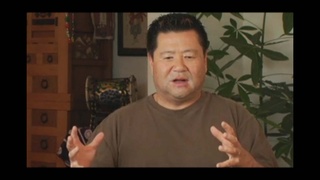Interviews
The J-Town Jazz Ensemble
So we got more and more involved with -- I got more involved with music. I don't know when it was, but it's, maybe going for thirteen. In 1989, about that time, '85-'89, I met Mark Izu, a Sansei bass player, and I really marveled at his proficiency, technique, interest in music. He wanted to be, at that time, a professional musician.
In fact, he was a professional musician. That was his trade at that time, but not too many gigs, of course. But I talked to him and said, geez, Mark, sure would be kind of fun to have a big band of some sort because we started hearing more about the availability of Sansei musicians. I said, it'd be kind of neat to have an organization to introduce them to swing music if you had not -- if they had not played in such a group, which they had not. ... That was thirteen years ago, and we're still going strong. And it's really a great organization, I think, musically. But in terms of social contacts and the sharing of --
I*: And this, this was the J-Town --
J-Town Jazz Ensemble. And I used the word "ensemble" because if I said "J-Town Big Band," I didn't know whether we'd be a big band, how big or small it was. It was, turned out to be seventeen pieces: five saxophones, four trumpets, four trombones, four-piece rhythm section. We do have two vocalists now. And I was graduated into something other than playing the drums because there were so many young drummers who could read the music and were quite capable.
And again, it was the, my idea was to serve as a role model, too. If that wasn't there, there'd be nothing for them. I wouldn't say nothing, but it, the kids would not have had the experience of what we're doing now. It became a very social group.
* "I" indicates an interviewer (Alice Ito).
Date: February 18, 2002
Location: Washington, US
Interviewer: Alice Ito, John Pai
Contributed by: Denshō: The Japanese American Legacy Project.
Explore More Videos


Taiko is a reflection of where you live
Senshin Buddhist Temple minister and co-founder of Kinnara Taiko.

Playing traditional gagaku while creating an identity
Senshin Buddhist Temple minister and co-founder of Kinnara Taiko.

Taiko as self-expression
Co-founder and creative director of San Jose Taiko

A “principally-based” taiko group in England creating a global taiko community
Co-founder and creative director of San Jose Taiko

Defining a Taiko player
(b.1951) Co-founder and managing director of San Jose Taiko.

The importance of Japanese American role models in childhood community
(b. 1955) Lawyer

Decision between becoming a minister or musician
(b. 1949) Musician and arts educator and adminstrator.

Parents didn't accept me playing taiko in the beginning
(b. 1949) Musician and arts educator and adminstrator.

Tango makes him to stay in Argentina (Spanish)
(1925-2014) La Plata Hochi, Journalist





